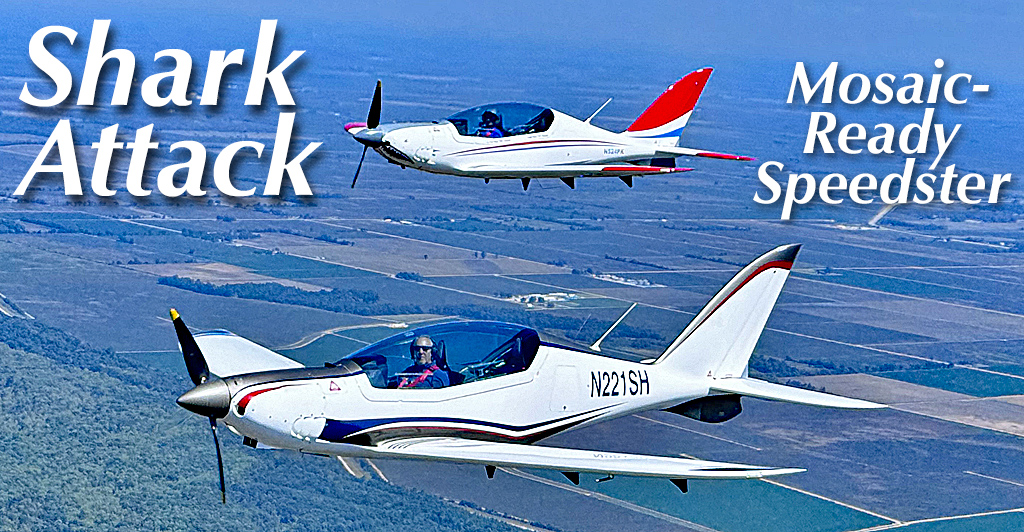
Readers who scour the Internet looking for fascinating Light-Sport Aircraft may already know Shark. Conceived by Jaro Dostal in the Czech Republic, this design is the latest from a man who has a long, storied history of aircraft for the light aviation set. Jaro’s work included the Skyboy from the early days of LSA and later the MD-3 SportRider. Both won approval from many pilots. All Jaro’s designs have one common easily-seen design characteristic: his shark fin vertical tail. Of course, this one is no different in that respect but it is the first to openly embrace the name. With this speedy aircraft already flying in North America and with more on the way, I couldn’t resist the compelling “Shark Attack” title. Let’s check it out. Shark.Aero Shark is built at a factory in the country of Slovakia in a region said to be well known for producing innovative designs.


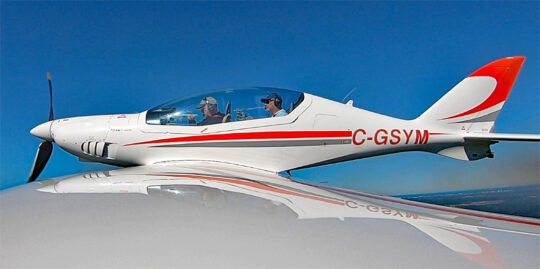 Jaro's work included the
Jaro's work included the 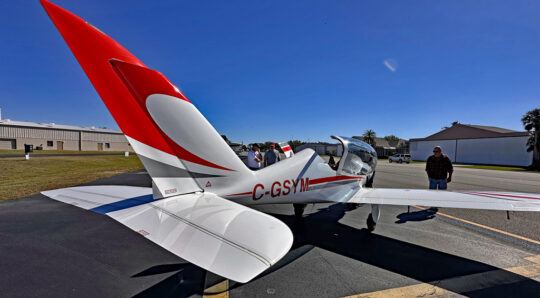 As North American importer, Chris Horsten, details in the video below, Shark 600 uses 3D-printed parts in non-critical, non-structural areas. The factory makes good use of this technology to facilitate and streamline production in areas that would be cost-prohibitive or time-consuming. "Examples of visible parts are the stick and throttle," said Shark Aero. Chris noted other uses like gear-door latches.
Chris runs
As North American importer, Chris Horsten, details in the video below, Shark 600 uses 3D-printed parts in non-critical, non-structural areas. The factory makes good use of this technology to facilitate and streamline production in areas that would be cost-prohibitive or time-consuming. "Examples of visible parts are the stick and throttle," said Shark Aero. Chris noted other uses like gear-door latches.
Chris runs 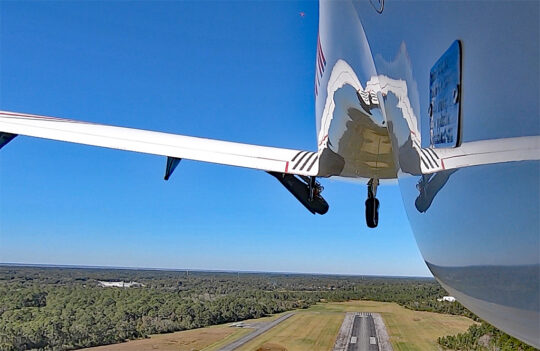 In my experience Shark handled beautifully. Roll control was moderate, not touchy. Elevator and rudder controls felt solid, befitting an aircraft of this size and construction. In turns, Shark held bank and altitude easily. Being tandem, the pilot always sits at the lateral center of gravity so the airplane quickly begins to feel like a part of you. We did nothing very radical but 720° steep turns at 45-60° bank revealed an aircraft that grips the air firmly. Shark always felt predictable.
As Chris notes in the video, stall is very slow on Shark. It looks like it is a speedster — and it does well — but the slow speed capabilities surprised a number of experienced pilots who examined the aircraft while I was setting up to interview Chris. A flaps-extended stall well below 40 knots is much lower than most expected.
In my experience Shark handled beautifully. Roll control was moderate, not touchy. Elevator and rudder controls felt solid, befitting an aircraft of this size and construction. In turns, Shark held bank and altitude easily. Being tandem, the pilot always sits at the lateral center of gravity so the airplane quickly begins to feel like a part of you. We did nothing very radical but 720° steep turns at 45-60° bank revealed an aircraft that grips the air firmly. Shark always felt predictable.
As Chris notes in the video, stall is very slow on Shark. It looks like it is a speedster — and it does well — but the slow speed capabilities surprised a number of experienced pilots who examined the aircraft while I was setting up to interview Chris. A flaps-extended stall well below 40 knots is much lower than most expected.
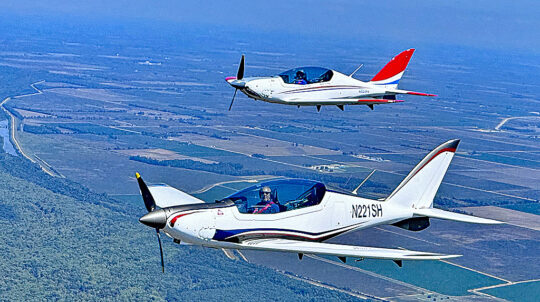 In flight we dawdled along at 50 knots with relative ease, especially knowing the stall was still 10-15 knots slower. Stalls tend not to drop a wing depending somewhat on how you enter the condition. Controls become softer, of course, but remained authoritative.
That translates to an aircraft that can accommodate fairly short runways. Takeoff is typical between 400-600 feet, said Chris. We landed on two long, confortable runways but we didn't use much of either. Climbout was brisk, 800-1,000 feet per minute at sea level with two aboard and three quarter tanks. Shark's deck angle remained shallow. This gives better forward visibility but some pilots may tend to raise the nose depending on what they flew earlier.
In flight we dawdled along at 50 knots with relative ease, especially knowing the stall was still 10-15 knots slower. Stalls tend not to drop a wing depending somewhat on how you enter the condition. Controls become softer, of course, but remained authoritative.
That translates to an aircraft that can accommodate fairly short runways. Takeoff is typical between 400-600 feet, said Chris. We landed on two long, confortable runways but we didn't use much of either. Climbout was brisk, 800-1,000 feet per minute at sea level with two aboard and three quarter tanks. Shark's deck angle remained shallow. This gives better forward visibility but some pilots may tend to raise the nose depending on what they flew earlier.
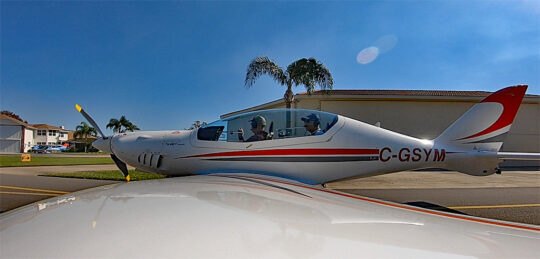 The price of the Shark aircraft "reflects the cost of thousands of precision-engineered parts, an all-carbon fibre structure with a Kevlar cage, and approximately 4,000 hours of skilled craftsmanship," noted the factory. They've delivered more than 100 aircraft, mostly around Europe.
The price of the Shark aircraft "reflects the cost of thousands of precision-engineered parts, an all-carbon fibre structure with a Kevlar cage, and approximately 4,000 hours of skilled craftsmanship," noted the factory. They've delivered more than 100 aircraft, mostly around Europe.
 One of the most remarkable achievements came during Mack's journey. In the longest flight of the missions, Shark carried him non-stop for 10 hours from Kushiro, Japan, to Casco Cove, USA, without any refueling or stopovers. This flight also set a record for the longest distance flown over water.
In 2015, a new FAI world speed record was set by Eric de Barbarin-Barbarini, who clocked in at 303 kilometers per hour (163.6 knots). This record was set with a Rotax 912 ULS 100-horsepower naturally-aspirated engine, and without some of the more recent aerodynamic refinements which have since been incorporated into the airframe. —Shark Aero
One of the most remarkable achievements came during Mack's journey. In the longest flight of the missions, Shark carried him non-stop for 10 hours from Kushiro, Japan, to Casco Cove, USA, without any refueling or stopovers. This flight also set a record for the longest distance flown over water.
In 2015, a new FAI world speed record was set by Eric de Barbarin-Barbarini, who clocked in at 303 kilometers per hour (163.6 knots). This record was set with a Rotax 912 ULS 100-horsepower naturally-aspirated engine, and without some of the more recent aerodynamic refinements which have since been incorporated into the airframe. —Shark Aero
 Video recorded November 2024 at Spruce Creek Fly-In airport (7FL6) with North American importer Chris Horsten.
https://youtu.be/JObUKp4R64Q
Video recorded November 2024 at Spruce Creek Fly-In airport (7FL6) with North American importer Chris Horsten.
https://youtu.be/JObUKp4R64Q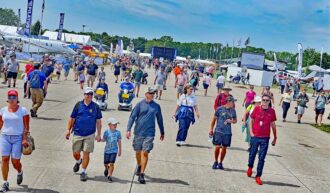 AirVenture Oshkosh is arguably the most important aviation event in the world each year, bringing people together from all points on the compass… or, at least it usually does.
For 2021, international representation was far below the usual. I don't have hard numbers but few of my overseas airshow friends could make this year's event.
AirVenture Oshkosh is arguably the most important aviation event in the world each year, bringing people together from all points on the compass… or, at least it usually does.
For 2021, international representation was far below the usual. I don't have hard numbers but few of my overseas airshow friends could make this year's event.
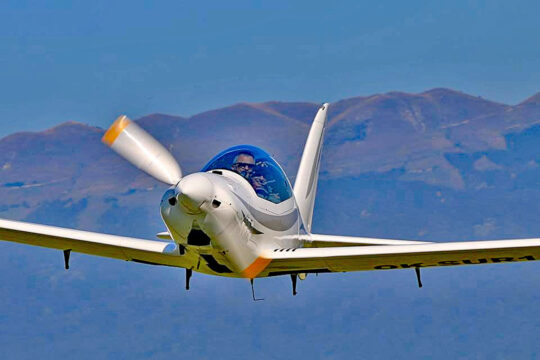 One objective of mine was achieved when a trusted, reliable source provided me with hard data about the state of the light aviation industry around the world. Most readers know I follow the
One objective of mine was achieved when a trusted, reliable source provided me with hard data about the state of the light aviation industry around the world. Most readers know I follow the 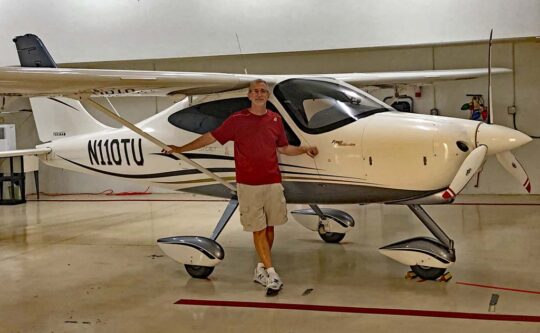
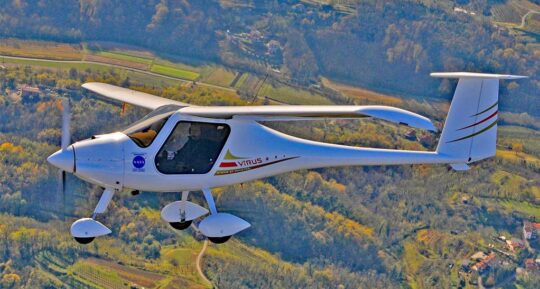
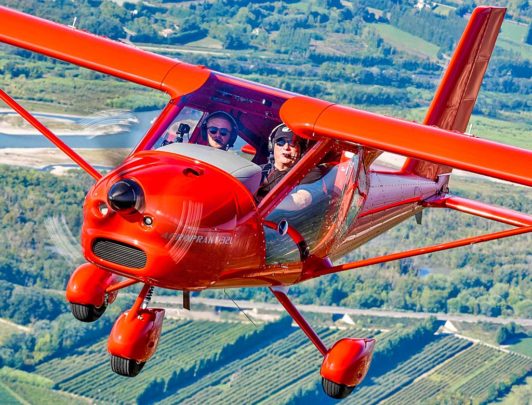
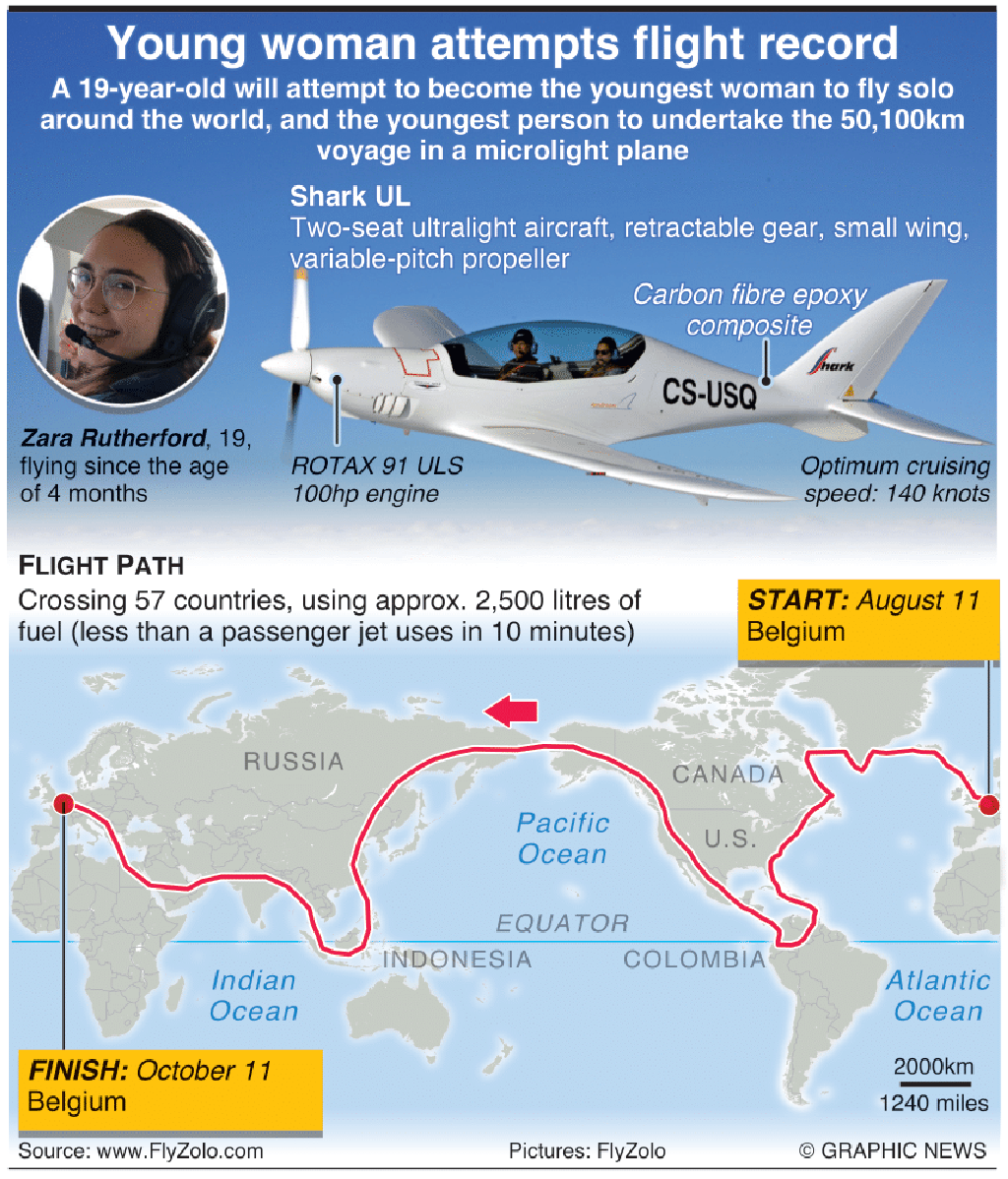 Do you think you have what it takes to fly around the world?
At minimum, such a trek involves lot of hours in a fairly confined space plus a challenging amount of waiting (for weather, maintenance, permission). At worst, it could be intimidating and dangerous, for example when crossing the frigid North Atlantic. You also have to cope with foreign languages and different customs. Your body clock would be catching up for weeks.
Do you think you have what it takes to fly around the world?
At minimum, such a trek involves lot of hours in a fairly confined space plus a challenging amount of waiting (for weather, maintenance, permission). At worst, it could be intimidating and dangerous, for example when crossing the frigid North Atlantic. You also have to cope with foreign languages and different customs. Your body clock would be catching up for weeks.
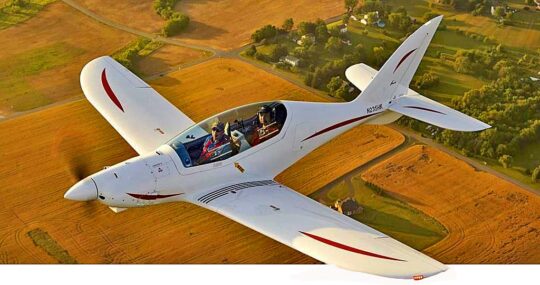 Zara has a good aviation foundation. She reports traveling in small planes since the age of six, skydiving at 11, and flying a plane at 14. After all that why not go for broke at 19? Ah, youth!
"I will be flying a
Zara has a good aviation foundation. She reports traveling in small planes since the age of six, skydiving at 11, and flying a plane at 14. After all that why not go for broke at 19? Ah, youth!
"I will be flying a  The title isn't new.
For 14 years I wrote a column I called "The Light Stuff" for Kitplanes magazine. The column name was an adaptation of "The Right Stuff" movie about astronauts.
The title isn't new.
For 14 years I wrote a column I called "The Light Stuff" for Kitplanes magazine. The column name was an adaptation of "The Right Stuff" movie about astronauts.
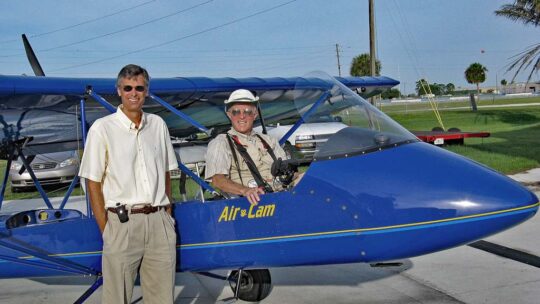 Through those years, a man I learned to deeply admire edited the publication. Many readers will recognize the name Dave Martin from earlier days. He had an impeccable reputation earned through thoroughness and fairness, capability and approachability. I could never slack off when preparing material for Dave. He could be a tough taskmaster but also acknowledged when a piece was good. My writing undoubtedly improved because of years of input he offered me. I so enjoyed working with him.
With sadness I note his passing, alerted by mutual friend Phil Lockwood, developer of the AirCam (photo) in which Dave is seated when the two made a flight to the Bahamas. So long, Dave!
Through those years, a man I learned to deeply admire edited the publication. Many readers will recognize the name Dave Martin from earlier days. He had an impeccable reputation earned through thoroughness and fairness, capability and approachability. I could never slack off when preparing material for Dave. He could be a tough taskmaster but also acknowledged when a piece was good. My writing undoubtedly improved because of years of input he offered me. I so enjoyed working with him.
With sadness I note his passing, alerted by mutual friend Phil Lockwood, developer of the AirCam (photo) in which Dave is seated when the two made a flight to the Bahamas. So long, Dave! 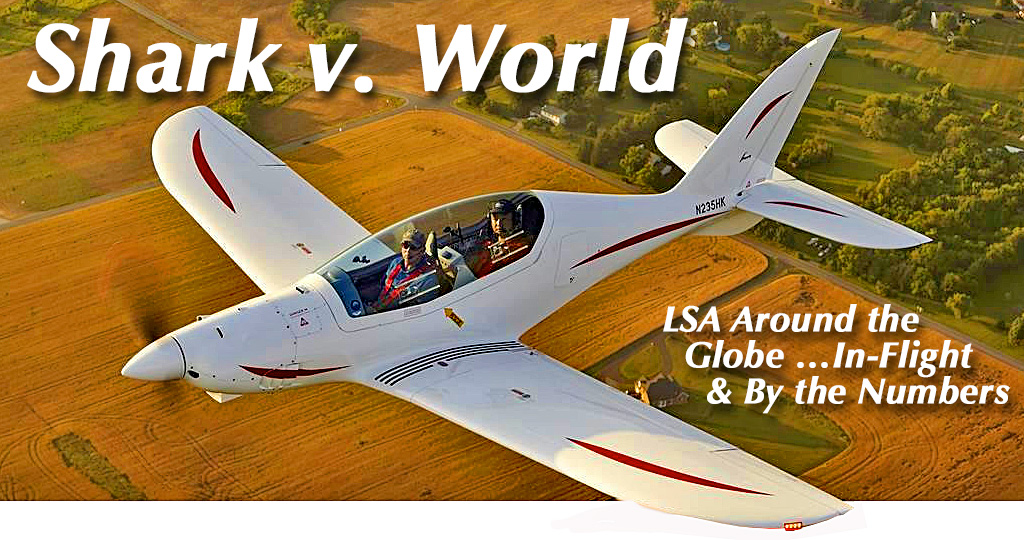
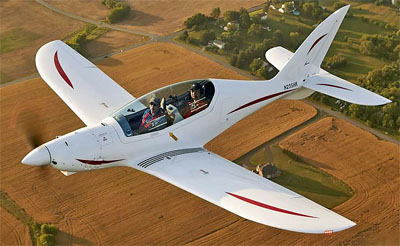 This Shark is one I've long admired since meeting its creator, Jaro Dostal many years ago at the German airshow
This Shark is one I've long admired since meeting its creator, Jaro Dostal many years ago at the German airshow 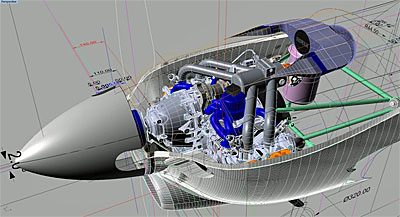 A special "Mako" Shark is now available, reported an enthusiastic Jon. "The Rotax 915-powered Shark will enhance high altitude performance, increase cruising speed, and rate of climb" he said. "The first prototype is expected to be completed this summer." The factory is now taking orders. The nearby images show new, larger cowlings to accommodate a turbocharged, intercooler-equipped 135 horsepower engine.
If you are enticed, here are two ways to acquire Shark.
Order a new aircraft — "The factory will now take €4,000 (about $5,000 but this can change) non-refundable or €15,000 (about $19,000) refundable deposit to hold a production slot. Upon receiving the deposit, the factory will assign a production slot and an expected delivery date. Progress payments will be requested at various intervals.
A special "Mako" Shark is now available, reported an enthusiastic Jon. "The Rotax 915-powered Shark will enhance high altitude performance, increase cruising speed, and rate of climb" he said. "The first prototype is expected to be completed this summer." The factory is now taking orders. The nearby images show new, larger cowlings to accommodate a turbocharged, intercooler-equipped 135 horsepower engine.
If you are enticed, here are two ways to acquire Shark.
Order a new aircraft — "The factory will now take €4,000 (about $5,000 but this can change) non-refundable or €15,000 (about $19,000) refundable deposit to hold a production slot. Upon receiving the deposit, the factory will assign a production slot and an expected delivery date. Progress payments will be requested at various intervals.
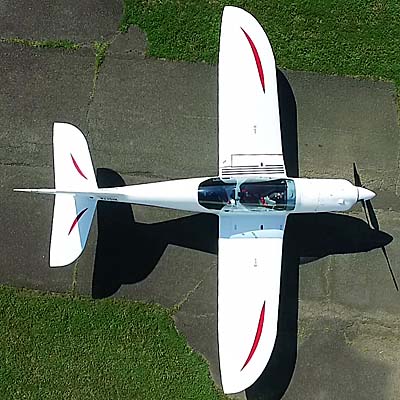 "The current factory backlog is between 18-24 months for a ready-to-fly aircraft or approximately 5-6 months for a kit," wrote Jon. However, he added, "With the factory ramping up to three from one aircraft per month, the wait is expected to decrease."
If you want the current final price and options list, contact Jon via email (see below).
If you can't handle the long wait or don't want to send chunks of money overseas, another way exists to own a Shark and no building is required.
"Shark UL 025, our current demonstrator aircraft, is up for sale," wrote Jon. "It is ready for delivery in April 2018 and has all the options, has been superbly cared for and is fully up to date with the latest features." How much? "We are asking €150,000 (about $188,000) plus delivery charges. Please contact me (via
"The current factory backlog is between 18-24 months for a ready-to-fly aircraft or approximately 5-6 months for a kit," wrote Jon. However, he added, "With the factory ramping up to three from one aircraft per month, the wait is expected to decrease."
If you want the current final price and options list, contact Jon via email (see below).
If you can't handle the long wait or don't want to send chunks of money overseas, another way exists to own a Shark and no building is required.
"Shark UL 025, our current demonstrator aircraft, is up for sale," wrote Jon. "It is ready for delivery in April 2018 and has all the options, has been superbly cared for and is fully up to date with the latest features." How much? "We are asking €150,000 (about $188,000) plus delivery charges. Please contact me (via